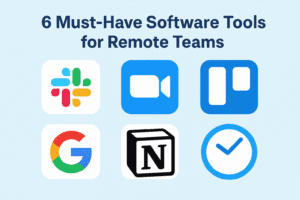Introduction
Remote work is no longer just a trend — it has become a standard way of doing business for many organizations worldwide. While working from home offers flexibility and freedom, it also comes with challenges like miscommunication, lack of transparency, and decreased productivity if the right systems aren’t in place.
To overcome these challenges, remote teams rely on powerful software tools designed to streamline communication, project management, and collaboration. Here are six must-have software tools for remote teams that can transform the way you work together.

1. Slack or Microsoft Teams – Instant Communication
Every successful remote team needs a reliable communication hub. Slack and Microsoft Teams are among the most popular tools that allow teams to send instant messages, create dedicated channels, and integrate with other apps.
Best for: Day-to-day communication and quick updates
Key features: File sharing, voice and video calls, app integrations
Why it matters: Keeps conversations transparent and organized
2. Zoom or Google Meet – Video Meetings Made Easy
When email and chat aren’t enough, video conferencing tools step in. Zoom and Google Meet make it simple to host meetings, share screens, and collaborate in real-time.
Best for: Team meetings, client calls, and presentations
Key features: Screen sharing, recording, breakout rooms (Zoom)
Why it matters: Brings remote teams closer through face-to-face interaction
3. Trello, Asana, or Jira – Project Management
Managing projects across a remote team can get messy without the right tool. Trello, Asana, and Jira help teams track tasks, deadlines, and responsibilities with ease.
Best for: Task tracking and project organization
Key features: Kanban boards, task assignments, progress tracking
Why it matters: Ensures accountability and keeps projects on schedule

4. Google Workspace or Microsoft 365 – Collaboration on Documents
Remote teams need to work on documents, spreadsheets, and presentations together in real-time. Google Workspace and Microsoft 365 make collaboration seamless by allowing multiple people to edit files simultaneously.
Best for: Document creation and team collaboration
Key features: Cloud storage, real-time editing, version history
Why it matters: Eliminates confusion caused by sending multiple file versions
5. Notion – Team Wiki and Knowledge Base
Keeping track of team knowledge, processes, and resources is crucial for distributed teams. Notion is an all-in-one workspace for notes, wikis, databases, and project management.
Best for: Knowledge sharing and team documentation
Key features: Customizable templates, databases, task boards
Why it matters: Centralizes knowledge and reduces repetitive questions
6. Clockify or Toggl – Time Tracking & Productivity
To ensure productivity and balance workloads, remote teams often use time-tracking software like Clockify or Toggl. These tools help track hours, monitor productivity, and generate reports.
Best for: Tracking work hours and billable time
Key features: Timesheets, reporting, integrations with project tools
Why it matters: Helps teams stay accountable and measure productivity
Conclusion
Remote work can be highly effective — but only if teams have the right tools in place. From communication to project management and time tracking, these six software solutions provide the foundation for successful collaboration.
No single tool will fit every team perfectly, so experiment with different options and build a toolkit that supports your workflow.

Related Article
For more tips on secure cloud storage and choosing the right service, check out our previous guide:
The Best Cloud Storage Services in 2025

